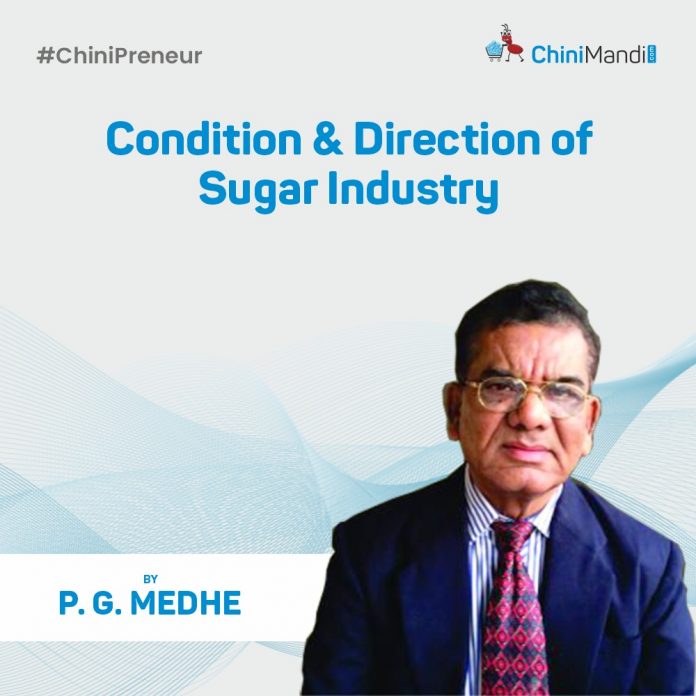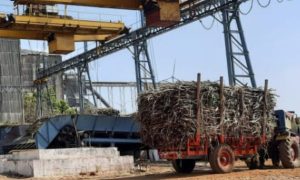Reviving sweet fortunes: The crucial role of sugar conferences amid financial challenges

The Indian sugar industry, a cornerstone of the rural economy, is currently grappling with severe financial stringency specifically due to delayed decisions about increase in Sugar MSP, Ethanol prices and Sugar Export. With millions of livelihoods at stake, the need for strategic dialogue and collaborative solutions has never been more critical. In this challenging landscape, the organization of sugar conferences emerges as a vital platform for stakeholders to converge, share insights, and chart a sustainable path forward.
The Indian sugar industry, a cornerstone of the rural economy, is currently grappling with severe financial stringency specifically due to delayed decisions about increase in Sugar MSP, Ethanol prices and Sugar Export. With millions of livelihoods at stake, the need for strategic dialogue and collaborative solutions has never been more critical. In this challenging landscape, the organization of sugar conferences emerges as a vital platform for stakeholders to converge, share insights, and chart a sustainable path forward.
Financial Difficulties Faced ByThe Indian Sugar Industry:
The Indian sugar industry is currently navigating through a challenging financial landscape, marked by several critical issues:
1) Low Sugar Prices:
The cost of producing sugar stands at approximately ₹4166 per quintal, while the market price is around ₹3400 per quintal. This significant gap between production costs and selling prices is leading to substantial financial losses for sugar mills.
2) High Production Costs:
The cost of sugarcane, the primary raw material, has increased significantly. The Fair and Remunerative Price (FRP) of sugarcane has been revised from ₹2750 to ₹3400 per metric ton (MT). Despite this increase, the prices of ethanol, a by-product of sugarcane, have not been revised, adding to the financial strain on the industry.
3) Mounting Debts:
Many sugar mills are burdened with high levels of debt due to the ongoing financial losses and the need to finance operations and pay farmers. This debt accumulation is further exacerbating the financial instability of the industry.
Surplus Sugar Production:
According to the balance sheet for the 2024-25 period, there is a surplus of sugar, with a buffer stock of 66 lakh metric tons, which is equivalent to three months of consumption. This surplus is putting additional downward pressure on sugar prices, making it even more difficult for mills to cover their costs.
IMPORTANCE OF ORGANISING NATIONAL LEVEL SUGAR CONFERENCES:
Given these financial difficulties, organizing sugar conferences becomes crucial for several reasons:
1) Knowledge Sharing:
Conferences provide a platform for industry experts to share insights on cost-reduction strategies, innovative production techniques, and market trends.
2) Policy Advocacy:
They offer an opportunity for stakeholders to engage with policymakers and advocate for supportive measures, such as revising ethanol prices and providing financial assistance to struggling mills.
3) Networking:
Bringing together various stakeholders, including producers, traders, researchers, and government officials, can foster collaborations that lead to more efficient and sustainable practices.
4) Strategic Planning:
Conferences can help in developing strategies to manage surplus production, such as exploring export opportunities or diversifying into value-added products.
By addressing these financial challenges through collaborative efforts and strategic planning, the Indian sugar industry can work towards a more stable and sustainable future.
CASE STUDIES & SUCCESS STORIES FROM SUGAR CONFERENCES:
1) ChiniMandi Conference:
Case Study:
The ChiniMandi has been instrumental in organizing several national sugar conferences, focusing on the modernization and sustainability of the sugar industry.
Success Story:
One of the notable outcomes from these conferences is the submission of a comprehensive “White Paper” to the Union Government of India. This document contains detailed recommendations for policy formulation aimed at addressing the financial and operational challenges faced by the Indian sugar industry.
2) National Sugar Institute (NSI) Conferences:
Case Study:
The NSI in Kanpur has been organizing annual sugar conferences that bring together industry experts, researchers, and policymakers. These conferences have led to significant advancements in sugarcane breeding techniques and the adoption of modern agricultural practices.
Success Story:
Recommendations from these conferences have influenced the Government of India to implement policies promoting the use of high-yielding sugarcane varieties, which have increased productivity and reduced production costs.
3) International Sugar Organization (ISO) Meetings:
Case Study:
The ISO regularly holds international conferences that focus on global sugar market trends, trade policies, and sustainability practices. Indian delegates have actively participated in these meetings, gaining valuable insights and forming international collaborations.
Success Story:
Following ISO recommendations, the Indian government has adopted measures to stabilize sugar prices through export incentives and buffer stock maintenance, helping to mitigate the impact of surplus production on domestic prices.
4) Vasantdada Sugar Institute (VSI), Manjari, Pune:
The Vasantdada Sugar Institute (VSI) in Manjari, Pune, has been a beacon of innovation and progress in the sugar industry. Their conferences, particularly the International Sugar Conferences, have played a pivotal role in shaping the future of the industry.
Case Study:
International Sugar Conferences
1. Sustainability and Innovation Focus:
VSI’s conferences have consistently emphasized sustainability, innovation, and diversification in the sugar and allied industries. For instance, the 2nd International Conference and Exhibition on Sustainability held in 2020 covered a wide range of topics, including soil resilience, water resource management, advanced agro techniques, and biofuels1.
2. Policy Influence:
These conferences have also been instrumental in influencing government policies. At the International Sugarcane Conference in 2024, Union Minister Nitin Gadkari assured sugar mill owners that the government would address their concerns regarding the use of sugar for ethanol production. This highlights the conferences’ role in bridging the gap between industry stakeholders and policymakers.
3. Global Collaboration:
VSI’s conferences have fostered global collaboration by bringing together experts from around the world. The third International Sugar Conference in 2024, for example, provided a platform for discussing the latest advancements and challenges in the global sugar industry
Success Stories
1) Technological Advancements:
The conferences have led to significant technological advancements in the sugar industry. Topics such as mechanization of sugarcane planting and the use of gamma radiation for sugarcane improvement have been discussed, leading to practical applications and increased productivity1.
2) Ethanol Production:
VSI’s focus on ethanol production has been a game-changer for the industry. The conferences have promoted the idea of “Maximum ethanol, minimum sugar,” encouraging the industry to diversify and adopt sustainable practices2.
3) Knowledge Sharing:
The conferences have served as a knowledge-sharing hub, where researchers and industry experts present their findings and innovations. This has led to the dissemination of best practices and cutting-edge research, benefiting the entire sugar industry.
The success of these conferences lies in their ability to bring together diverse stakeholders, foster innovation, and influence policy, thereby driving the sugar industry towards a sustainable and prosperous future.
Recommendations to the Government of India
These conferences have consistently provided valuable recommendations to the Government of India, including:
1) Policy Formulation:
Developing policies that support the financial sustainability of sugar mills, such as revising ethanol prices in line with sugarcane FRP increases.
2) Market Stabilization:
Implementing measures to manage surplus production, including export incentives and maintaining buffer stocks.
3) Technological Advancements:
Promoting the adoption of modern agricultural practices and high-yielding sugarcane varieties to enhance productivity and reduce costs.
4) Sustainability Initiatives:
Encouraging sustainable farming practices and efficient resource use to ensure long-term viability of the sugar industry.
By incorporating these recommendations, the Indian sugar industry can navigate its financial challenges and work towards a more sustainable and prosperous future.
FUTURE PROSPECTS AND POTENTIAL BENEFITS OF SUGAR CONFERENCES:
1. Improved Market Stability:
Strategic Planning:
Continued organization and participation in sugar conferences enable stakeholders to engage in strategic planning and market analysis. This helps in anticipating market trends and making informed decisions to stabilize sugar prices.
Policy Advocacy:
Conferences provide a platform for advocating policies that support market stability, such as export incentives, buffer stock maintenance, and fair pricing mechanisms. These policies can help mitigate the impact of surplus production and ensure a balanced supply-demand scenario.
2. Enhanced Production Techniques:
Knowledge Sharing:
Sugar conferences facilitate the exchange of knowledge and best practices among industry experts, researchers, and practitioners. This includes advancements in sugarcane breeding, pest management, and efficient irrigation techniques.
Technological Innovations:
Exposure to the latest technological innovations in sugar production and processing can lead to the adoption of more efficient and cost-effective methods. This can significantly enhance productivity and reduce production costs.
3. Better Financial Management:
Financial Strategies:
Conferences often include sessions on financial management, where experts share strategies for managing debts, optimizing operational costs, and improving profitability.
This knowledge can help sugar mills navigate financial challenges more effectively.
Investment Opportunities:
Networking opportunities at conferences can lead to new investment prospects, partnerships, and collaborations that provide financial support and resources for sugar mills.
4. Promoting Sustainability Practices:
Environmental Stewardship:
Sugar conferences emphasize the importance of sustainable practices, such as reducing water usage, minimizing chemical inputs, and adopting eco-friendly farming techniques. These practices not only benefit the environment but also enhance the long-term viability of the sugar industry.
Sustainable Policies:
Recommendations from conferences often lead to the formulation of policies that promote sustainability. For example, policies encouraging the use of renewable energy sources, such as ethanol, contribute to reducing the industry’s carbon footprint.
The Tale of Conferences in Promoting Sustainability
Sugar conferences have played a pivotal role in promoting sustainability within the industry. Here are some key aspects:
1) Case Studies and Success Stories:
Conferences highlight successful case studies where sustainable practices have led to improved yields, reduced costs, and better environmental outcomes. These stories inspire other stakeholders to adopt similar practices.
2) Collaborative Efforts:
By bringing together diverse stakeholders, conferences foster collaboration on sustainability initiatives. This includes joint research projects, pilot programs, and community-based efforts to promote sustainable sugarcane farming.
3) Global Perspectives:
International conferences provide insights into global sustainability trends and practices. Indian sugar mills can learn from these experiences and implement globally recognized sustainable practices.
The continued organization and participation in sugar conferences hold immense potential for the Indian sugar industry. By focusing on market stability, enhanced production techniques, better financial management, and sustainability practices, these conferences can drive positive change and ensure the industry’s long-term success. Embracing the recommendations and insights gained from these events will empower the industry to overcome current challenges and thrive in the future.
CALL TO ACTION :
The future of the Indian sugar industry hinges on proactive and collaborative efforts. Here are some key actions that stakeholders, including the Union Government, can take:
1) Active Participation:
Engage in Conferences:
Industry stakeholders, including sugar mill owners, farmers, policymakers, and researchers, should actively participate in national and international sugar conferences. These events are crucial for knowledge sharing, networking, and strategic planning.
2) Advocate for Policy Support:
Policy Recommendations:
Utilise the platforms provided by sugar conferences to advocate for policies that address the financial and operational challenges of the industry. This includes revising ethanol prices, providing export incentives, and supporting sustainable practices.
3) Adopt Sustainable Practices:
Environmental Stewardship:
Embrace sustainable farming and production practices to enhance the long-term viability of the industry. This includes efficient water use, reduced chemical inputs, and the adoption of renewable energy sources like ethanol.
4) Collaborate and Innovate:
Partnerships:
Foster collaborations between industry stakeholders, research institutions, and government bodies to drive innovation and efficiency. Joint efforts can lead to the development of new technologies and practices that benefit the entire industry.
5) Invest in Technology:
Modernisation:
Invest in modern technologies and infrastructure to improve production efficiency and reduce costs. This includes advanced irrigation systems, high-yielding sugarcane varieties, and state-of-the-art processing equipment.
6) Support Financial Stability:
Financial Management:
Implement effective financial management strategies to navigate the current financial challenges. This includes optimizing operational costs, managing debts, and exploring new revenue streams like ethanol production.
Union Government’s Responsibilities
The Union Government plays a crucial role in supporting the sugar industry. Here are some specific actions the government can take:
Policy Formulation and Implementation:
Revised Ethanol Prices:
Regularly revise ethanol prices to ensure they are in line with the increased FRP of sugarcane, providing a fair return to sugar mills.
Export Incentives:
Provide export incentives to help sugar mills access international markets and manage surplus production effectively.
Financial Assistance:
Subsidies and Grants:
Offer subsidies and grants to sugar mills for adopting modern technologies and sustainable practices. This financial support can help reduce production costs and improve profitability.
Debt Relief Programs:
Implement debt relief programs to assist sugar mills in managing their financial burdens and ensuring their long-term viability.
Infrastructure Development:
Ethanol Production Facilities:
Support the establishment of ethanol production facilities through financial assistance and streamlined regulatory processes. This will encourage more sugar mills to diversify into ethanol production.
Research and Development: Invest in research and development initiatives focused on improving sugarcane yields, pest management, and sustainable farming practices.
Market Stabilization Measures:
Buffer Stock Maintenance:
Maintain buffer stocks of sugar to stabilize market prices and prevent sharp fluctuations that can adversely affect the industry.
Fair Pricing Mechanisms:
Ensure fair pricing mechanisms for sugarcane and sugar to protect the interests of both farmers and sugar mills.
Sustainability Initiatives:
Renewable Energy Promotion:
Promote the use of renewable energy sources, such as ethanol, to reduce the industry’s carbon footprint and contribute to environmental sustainability.
Sustainable Farming Practices:
Encourage the adoption of sustainable farming practices through awareness campaigns, training programs, and financial incentives.
By taking these actions, the Union Government can play a pivotal role in ensuring the stability, sustainability, and prosperity of the Indian sugar industry. Let’s work together to ensure the sweet success of our industry!
Conclusion
In conclusion, the organization and participation in sugar conferences are paramount for the Indian sugar industry, especially in these challenging times. These conferences serve as vital platforms for knowledge sharing, policy advocacy, and fostering collaborations that drive innovation and efficiency. By embracing sustainable practices, adopting modern technologies, and advocating for supportive policies, the industry can navigate its financial challenges and work towards a more stable and prosperous future. The Union Government’s proactive role in providing financial assistance, revising sugar MSP, ethanol prices, export promotion and supporting infrastructure development is crucial in this journey. Together, through collective efforts and strategic planning, we can ensure the sweet success and sustainability of the Indian sugar industry for generations to come.
P.G. Medhe is the former Managing Director of Shri Chhatrapati Rajaram Sahakari Sakhar Karkhana Ltd and sugar industry analyst. He can be contacted at +91 9822329898.
To read more about Sugar Industry continue reading Agriinsite.com
Source : Chinimandi














